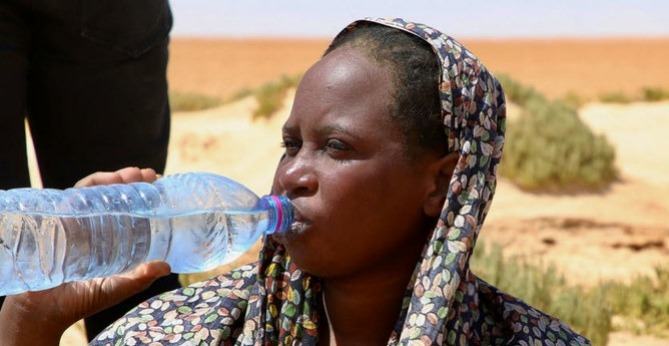Under the relentless desert sun, a group of exhausted migrants, including pregnant Sudanese nurse Tafaul Omar, found themselves in a dire situation near the border area between Tunisia and Libya. They claimed to have been arrested by Tunisian authorities and then abandoned in the barren wilderness of the desert, an allegation strongly denied by Tunisia. The group, hailing from countries such as Sudan, Senegal, Ghana, and Mali, narrated their harrowing journey, highlighting the physical and emotional toll of their ordeal.Omar’s tale echoed the sentiment of despair shared by many in the group. Walking for hours through the unforgiving desert, they were eventually discovered by a Libyan border patrol, accompanied by Reuters journalists. For Omar, who was not only pregnant but also fleeing from the turmoil in her homeland, the experience was traumatic. Sand caked her clothes, and the uncertainty of her unborn child’s fate only added to her distress.The migrants’ accounts shed light on a disturbing practice that has drawn international attention – the alleged expulsion of migrants by Tunisian authorities into the vast and remote desert landscape between Tunisia and Libya. Both the migrants and rights groups have accused Tunisia of engaging in this practice, which they consider a part of a broader crackdown on migrants. In contrast, Tunisia’s Interior Ministry vehemently denies these allegations, with President Kais Saied dismissing them as misinformation.The allegations have prompted outrage and concern, as reports have emerged of migrants’ bodies being discovered in the Libyan desert. Libya, a neighboring country, has become embroiled in the unfolding humanitarian crisis due to the influx of migrants and the subsequent deaths in the desert.Tunisia’s official stance maintains that it does not expel migrants in such a manner. Interior Ministry spokesperson Faker Bouzgaya rejected the accusations and emphasized Tunisia’s commitment to the welfare of migrants at its borders. However, migrant accounts paint a starkly different picture – stories of beatings, confiscation of phones, and abandonment in the harsh desert terrain.The situation becomes more complex as organizations such as the UN’s migration agency (IOM) provide assistance to migrants found in Libya near the Tunisian border. The IOM has reported aiding approximately 300 individuals, providing them with essential resources and medical support. Yet, as Giacomo Terenzi of the IOM in Libya noted, many migrants remain stranded in Ras Ijder, a coastal region approximately 35km from the assistance center in Alasaa.The backdrop to this crisis is a wider migration issue involving North Africa and Europe. The surge in migration has prompted Tunisia to implement measures to curb the flow, which has been met with controversy and accusations of racial discrimination. Thousands of migrants have attempted to leave Tunisia for Europe this year, fueling the urgency of the situation.The European Union’s response to the crisis raises additional questions. While critics argue that the EU’s support for migration measures in Libya perpetuates human rights abuses, the EU has pledged over 100 million euros to Tunisia to counter people smuggling and enhance border management.The story of Omar and her fellow migrants is a testament to the challenges faced by those seeking refuge and a better life. Their accounts highlight the complexities of migration policies, human rights, and the ethical responsibilities of nations in addressing a humanitarian crisis. As the accusations and denials continue to unfold, the plight of migrants remains a pressing concern that demands international attention and collective action.












